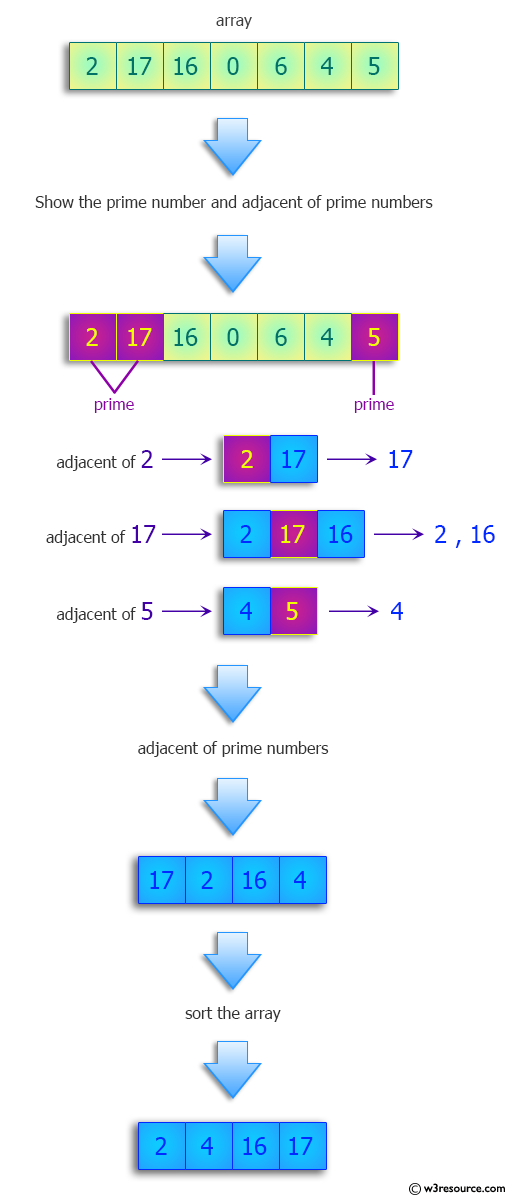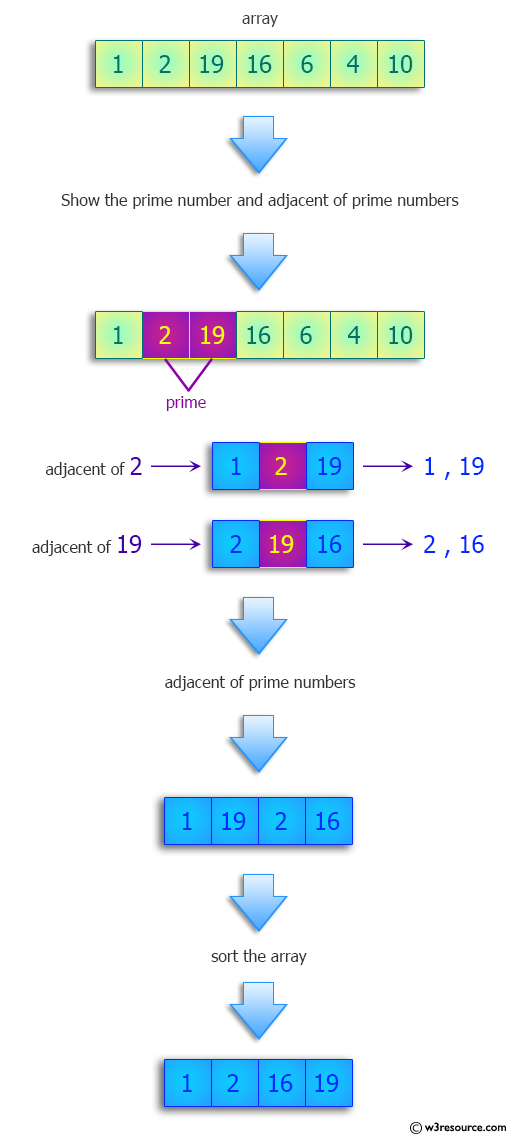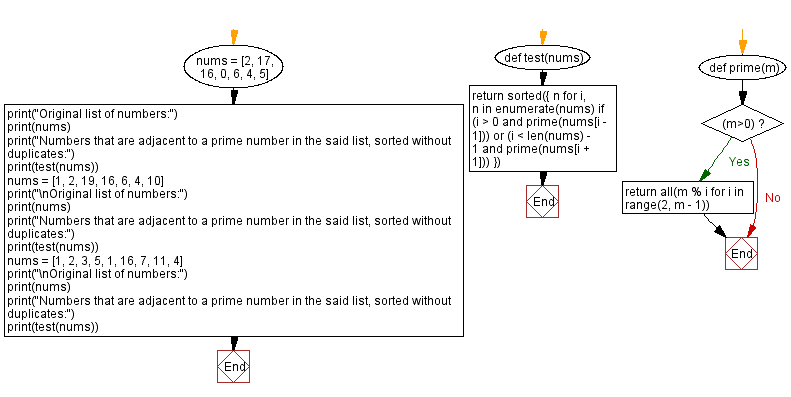Python: Find numbers that are adjacent to a prime number in the list, sorted without duplicates
Numbers Adjacent to Primes
Prime number: A number that is divisible only by itself and 1 (e.g. 2, 3, 5, 7, 11).
Write a Python program to find a list of all numbers that are adjacent to a prime number in the list, sorted without duplicates.
Input: [2, 17, 16, 0, 6, 4, 5] Output: [2, 4, 6, 16, 17] Input: [1, 2, 19, 16, 6, 4, 10] Output: [1, 2, 16, 19] Input: [1, 2, 3, 5, 1, 16, 7, 11, 4] Output: [1, 2, 3, 4, 5, 7, 11, 16]
Visual Presentation:



Sample Solution:
Python Code:
# Define a function named 'test' that takes a list of numbers as input
def test(nums):
# Use a set comprehension to create a set of numbers that are adjacent to a prime number in the list
return sorted({
n for i, n in enumerate(nums)
if (i > 0 and prime(nums[i - 1])) or (i < len(nums) - 1 and prime(nums[i + 1]))
})
# Define a function named 'prime' that checks if a given number is prime
def prime(m):
# Check if the number is greater than 0 and is divisible by any number in the range (2, m - 1)
return all(m % i for i in range(2, m - 1))
# Set a list of numbers
nums = [2, 17, 16, 0, 6, 4, 5]
# Print a message indicating the original list of numbers
print("Original list of numbers:")
# Print the original list of numbers
print(nums)
# Print a message indicating numbers adjacent to a prime number, sorted without duplicates
print("Numbers that are adjacent to a prime number in the said list, sorted without duplicates:")
# Print the result of the 'test' function applied to the numbers
print(test(nums))
# Set another list of numbers
nums = [1, 2, 19, 16, 6, 4, 10]
# Print a message indicating the original list of numbers
print("\nOriginal list of numbers:")
# Print the original list of numbers
print(nums)
# Print a message indicating numbers adjacent to a prime number, sorted without duplicates
print("Numbers that are adjacent to a prime number in the said list, sorted without duplicates:")
# Print the result of the 'test' function applied to the numbers
print(test(nums))
# Set yet another list of numbers
nums = [1, 2, 3, 5, 1, 16, 7, 11, 4]
# Print a message indicating the original list of numbers
print("\nOriginal list of numbers:")
# Print the original list of numbers
print(nums)
# Print a message indicating numbers adjacent to a prime number, sorted without duplicates
print("Numbers that are adjacent to a prime number in the said list, sorted without duplicates:")
# Print the result of the 'test' function applied to the numbers
print(test(nums))
Sample Output:
Original list of numbers: [2, 17, 16, 0, 6, 4, 5] Numbers that are adjacent to a prime number in the said list, sorted without duplicates: [2, 4, 16, 17] Original list of numbers: [1, 2, 19, 16, 6, 4, 10] Numbers that are adjacent to a prime number in the said list, sorted without duplicates: [1, 2, 16, 19] Original list of numbers: [1, 2, 3, 5, 1, 16, 7, 11, 4] Numbers that are adjacent to a prime number in the said list, sorted without duplicates: [1, 2, 3, 4, 5, 7, 11, 16]
Flowchart:

For more Practice: Solve these Related Problems:
- Write a Python program to scan a list of numbers and return those numbers which are immediately adjacent to a prime number.
- Write a Python program to check for each number if its preceding or succeeding number is prime and collect unique results.
- Write a Python program to use a helper function that determines if a neighbor is prime, then filter the list accordingly.
- Write a Python program to implement a one-pass algorithm that returns numbers with at least one prime neighbor, ensuring no duplicates.
Go to:
Previous: A valid filename.
Next: Find the number which when appended to the list makes the total 0.
Python Code Editor :
Have another way to solve this solution? Contribute your code (and comments) through Disqus.
What is the difficulty level of this exercise?
Test your Programming skills with w3resource's quiz.
